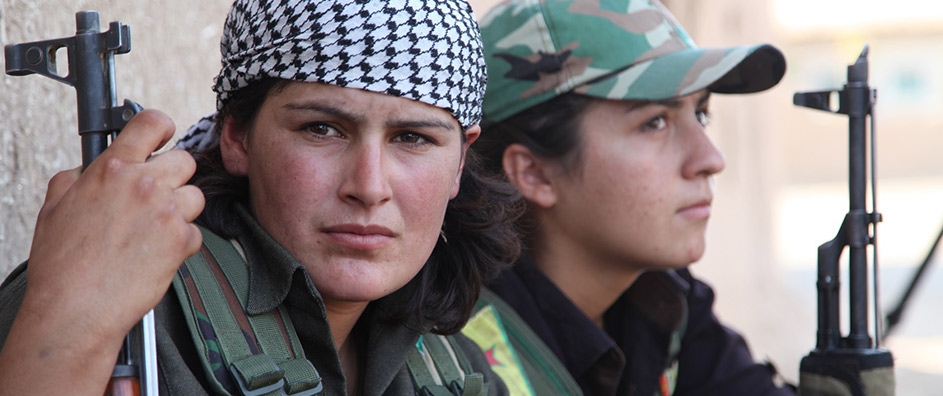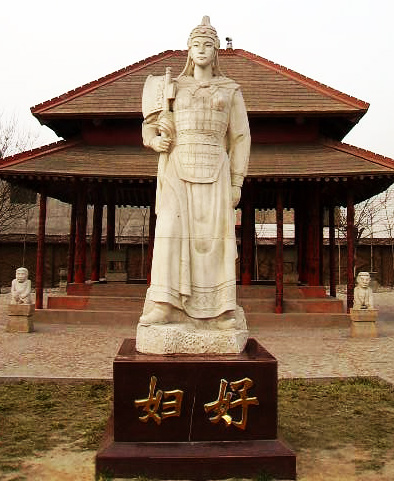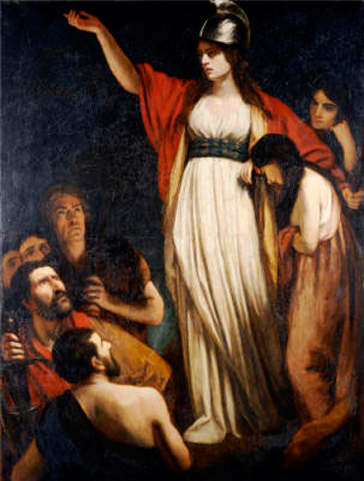The views expressed in our content reflect individual perspectives and do not represent the authoritative views of the Baha'i Faith.
When all mankind shall receive the same opportunity of education and the equality of men and women be realized, the foundations of war will be utterly destroyed. – Abdu’l-Baha, The Promulgation of Universal Peace, p. 175.
The United States Army announced recently that it would remove the restrictions preventing women from participating in active combat. Is this progress?
Well, if you study history, you’ll meet a few female warriors.
Lady Fu Hao, from the 13th century BC Shang Dynasty, led men into battle numerous times. In Greek mythology and the written records of the Romans we read stories of raids into Asia Minor by Amazon women. In the first century AD, Boudicca, queen of the Celtic Iceni tribe, led a rebellion against the Roman occupation of Britain and almost drove them out, destroying ancient London in the process. She was finally defeated–but not before making a lasting impression. In several societies women dressed as men participated as soldiers in battle. These examples stand out in myth and history because they depart so drastically from the norm. Why? Did most cultures simply deny women the opportunity to serve more fully in military activities, or is there a deeper reason women didn’t normally find conflict and warfare the first solution for disagreements, international or otherwise?
In 1912, on the eve of World War I, Abdu’l-Baha answered that important question as he invited both women and men to embrace a new paradigm of peace:
Therefore, strive to show in the human world that women are most capable and efficient, that their hearts are more tender and susceptible than the hearts of men, that they are more philanthropic and responsive toward the needy and suffering, that they are inflexibly opposed to war and are lovers of peace. – The Promulgation of Universal Peace, p. 284.
When Abdu’l-Baha gave this talk in the early part of the 20th century, presumably many in the audience did not favor full and equal rights for women. Perhaps these statements even brought some women a feeling of vindication. In the age of Darwin, women were often seen as full of only tenderness and philanthropy–hardly the attributes you would find useful in “the survival of the fittest.” Most people thought of the female as the “fairer sex,” completely unable to fight for herself.
But Abdu’l-Baha, in his call for the equality of women and men, pointed out that those female qualities of kindness and tenderness could help the world enormously:
Strive that the ideal of international peace may become realized through the efforts of womankind, for man is more inclined toward war than woman, and a real evidence of woman’s superiority will be her service and efficiency in the establishment of universal peace. – ibid, p. 284.
When he used the word “superiority,” he made it clear that the prevailing perception of female weakness could actually be seen as her greatest strength.
Until recent times, the history of women and the vital role they have played in the advancement of the human species has been largely ignored. The innate qualities that make her outstanding and a possible balancing energy for the human race have consistently been undervalued and underdeveloped. Worse, they have been used as evidence of inferiority. To counter that perception and practice, Abdu’l-Baha encouraged women to seek “the same arena of activity” as men:
The world of humanity is possessed of two wings: the male and the female. So long as these two wings are not equivalent in strength, the bird will not fly. Until womankind reaches the same degree as man, until she enjoys the same arena of activity, extraordinary attainment for humanity will not be realized; humanity cannot wing its way to heights of real attainment. – ibid, p. 37.
Baha’is believe, then, that the full emancipation of women goes beyond a nice thing to do, a gratuity to bestow. In this day, for humanity to progress further, women must achieve equality. Without it, humanity will be stymied in its attempts, not only to progress further, but to attain peace:
Only as women are welcomed into full partnership in all fields of human endeavour will the moral and psychological climate be created in which international peace can emerge. – The Universal House of Justice, The Peace Statement, October 1985.
So yes, history has shown women can fight for what they believe in–but the fight has now been elevated beyond a contest of might for wealth and territory. It has turned into a fight for the peaceful advancement of humanity. As women emerge from the shadows of inequality, the role she was always meant to play emerges–to take her stand on the battlefield of peace. This will not be done by assuming every male attribute, but by becoming more fully female.
Amazons for peace–unite!


















Comments
Sign in or create an account
Continue with Googleor